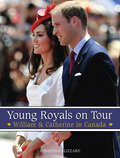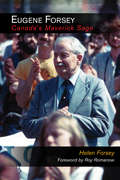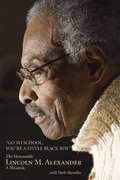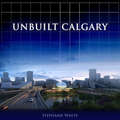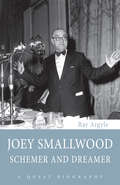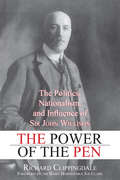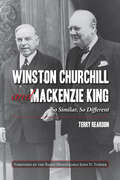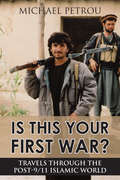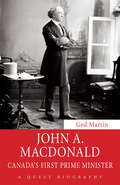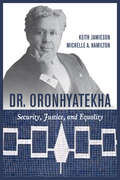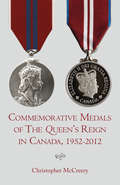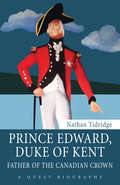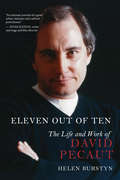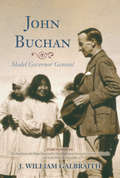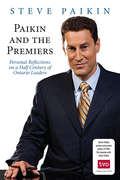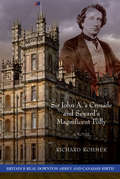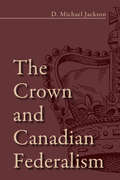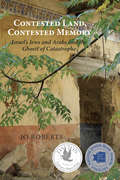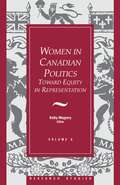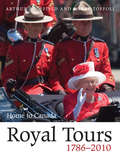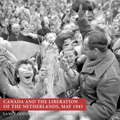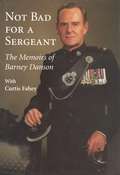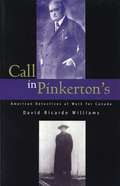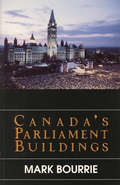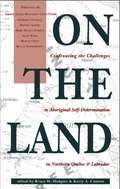- Table View
- List View
Young Royals on Tour: William & Catherine in Canada
by Christina BlizzardA day-by-day celebration in words and photographs of the young couple’s first tour of Canada. On April 29, 2011, Prince William of Wales married Catherine Middleton at Westminster Abbey in London. The newlyweds’ first royal tour took place in Canada from June 30 to July 8. People across the country rejoiced with the couple as they made their way through a land that holds special significance for the Royal Family, emphasizing and renewing the bond with Canada. This was not the Duke of Cambridges first trip "home to Canada," since he accompanied his parents, Charles and Diana, in 1991 and his father and brother, Harry, in 1998. This journey included such highlights as Canada Day in Ottawa, dragon boating in Prince Edward Island, visiting homeless youth in Quebec City, street hockey in Yellowknife, and a side trip to help bolster the courage of fire-devastated citizens in Slave Lake, Alberta. The Duke and Duchess presented the vibrant, modern face of the Royal Family, and excitement followed them everywhere as they travelled across Canada.
Eugene Forsey, Canada's Maverick Sage: Canada's Maverick Sage
by Helen Forsey Roy RomanowEugene Forsey combined vision with protest and erudition with wit. A legacy for the common good: Eugene Forsey’s wit and wisdom.Feisty and erudite, Eugene Alfred Forsey (1904-1991) was an activist scholar, labour researcher, constitutional expert, and senator who fought all his life for the common good. His speeches, articles, and letters informed and provoked Canadians for more than 60 years, and now his daughter brings that legacy back to life in this fascinating and relevant book.One of Canada’s foremost constitutional experts, Forsey was also a provocative voice for social justice. Legendary for his sharp wit and high principle, he brought encyclopedic knowledge, irascible tenacity, and common sense to the causes of democracy, justice, and equality for all. Those themes resound through this book and resonate strongly in the Canada of today.Forsey never managed to toe a party line obediently. Raised a Conservative, he converted to social democracy as a young academic in the 1930s. He spent the following decades working for the labour movement and the Co-operative Commonwealth Federation (CCF, now the New Democratic Party) and calling governments to account in speeches, articles, and pithy letters-to-the-editor. From 1970 to 1979, he sat in the Senate as a Trudeau Liberal, but soon afterward resumed his more natural role as non-partisan critic and gadfly.In labour halls, university classrooms, broadcasting studios, and the Senate chamber, Forsey entertained even as he educated. So, too, does this account of his works and life, which blends the personal and the political to provide a rich resource for Canadians facing the challenges of the 21st century.Helen Forsey, like her father, Eugene, is a social activist and writer, who worked overseas with CUSO and other international voluntary organizations. An ardent feminist and environmentalist, she winters in Ompah, Ontario, and summers at Pouch Cove, Newfoundland.
Go to School, You're a Little Black Boy: A Memoir
by Lincoln Alexander Herb ShovellerAmong the important stories that need to be told about noteworthy Canadians, Lincoln Alexander’s sits at the top of the list. Born in Toronto in 1922, the son of a maid and a railway porter, Alexander embarked on an exemplary life path that has involved military service for his country, a successful political career, a thriving law career, and vocal advocacy on subjects ranging from antiracism to the importance of education. In this biography, Shoveller traces a remarkable series of events from Alexander’s early life to the present that helped shape the charismatic and influential leader whose impact continues to be felt today. From facing down racism to challenging the postwar Ontario establishment, becoming Canada’s first black member of Parliament, entertaining royalty as Ontario’s lieutenant-governor, and serving as chancellor of one of Canada’s leading universities, Alexander’s is the ultimate, uplifting Canadian success story, the embodiment of what defines Canada.
Unbuilt Calgary: A History of the City That Might Have Been
by Stephanie WhiteThe essence of a vibrant, growing, and changing Calgary is captured over the life of its development. Calgary is a typical boom-and-bust town that was first based on ranching and farming, then oil and gas, and now energy. And energy is what its citizens have, whether for skiing, work, or construction. It is a city that leaps ahead eagerly to new futures and rarely looks back., but Calgary can also be an unsentimental city, discarding its ideas, plans, and buildings with ease. Unbuilt Calgary is a survey of 30 projects that were proposed but not realized, schemes that were situated at critical times in Calgary’s development, and proposals that indicated the city’s ambitions through its first 100 years. Unbuilt Calgary looks back to ideas and notions that might have been, and building endeavours that would have changed the shape of the city for better or worse. The 30 critical projects are accompanied by drawings and models to illustrate something of Calgary’s irrepressible exuberance.
Joey Smallwood: Schemer and Dreamer
by Ray ArgyleKnown as the "only living Father of Confederation" in his lifetime, Joey Smallwood was an entertaining, crafty, and controversial politician in Canada for decades. Born in Gambo, Newfoundland, Joseph ("Joey") Smallwood (1900–1991) spent his life championing the worth and potential of his native province. Although he was a successful journalist and radio personality, Smallwood is best known for his role in bringing Newfoundland into Confederation with Canada in 1949, believing that such an action would secure an average standard of living for Newfoundlanders. He was rightfully dubbed the "only living Father of Confederation" in his lifetime and was premier of the province for twenty-three years. During much of the last part of the twentieth century, Smallwood remained a prominent player in the story of Newfoundland and Labrador’s growth as a province. Later in life he put himself in debt in order to complete his Encyclopedia of Newfoundland and Labrador, the only project of its kind in Canada up to that point. In Joey Smallwood: Schemer and Dreamer, Ray Argyle reexamines the life of this incredible figure in light of Newfoundland’s progress in recent years, and measures his vision against its new position as a province of prosperity rather than poverty.
The Power of the Pen: The Politics, Nationalism, and Influence of Sir John Willison
by Richard Clippingdale Right Honourable Joe ClarkArguably, Sir John Willison had more influence on the evolution of Canada’s emerging nationalism and public policy shifts than any other journalist had in his time or since. Sir John Willison (1856-1927) was the most influential Canadian journalist in the late 19th and early 20th centuries while the country achieved economic growth, intellectual maturation, and world status. With his incisive pen and clear reasoning, Willison utilized Toronto’s Globe and News, his Times of London contributions, his many books and speeches, and his unparalleled connections with key political leaders to establish himself as a major national figure.Uniquely, Willison was at the heart of both the Liberal and Conservative Parties as a devoted supporter and good friend of Sir Wilfrid Laurier; a first employer, early booster, and continual admirer of William Lyon Mackenzie King; and a close ally of Sir Robert Borden. Willison was a major player in the epochal federal political shifts of 1896, 1911, and 1917 and articulated highly influential views on the nature and evolution of Canadian nationalism and public policy.
Winston Churchill and Mackenzie King: So Similar, So Different
by Terry Reardon The Right Honourable John N. TurnerThe story of the complex relationship between two world leaders during one of the greatest crises in human history. Born just two weeks apart in 1874, Winston Churchill and William Lyon Mackenzie King had much in common. Both forged long parliamentary careers, and each led his country to victory in World War II. A BBC poll deemed Winston Churchill the greatest Briton of all time, and Mackenzie King has been judged by a group of historians as the greatest Canadian prime minister. Their parallel careers fostered a working relationship that lasted almost fifty years. It was not always an easy relationship, however. Churchill, famous for his drink and cigars, was impetuous and charismatic, an extrovert; King, a teetotaller during WWII, was noted for considering all options before cautiously proceeding. Fate threw this ill-matched pair together. For the first time, the vital relationship between these two very different men is explored in depth. It is the story not just of two extraordinary leaders, but also of the changing bonds between Britain and Canada.
Is This Your First War?: Travels Through the Post-9/11 Islamic World
by Michael PetrouA leading journalist travels through the hot spots of the Middle East and Central Asia, from Pakistan and Afghanistan to Syria and Egypt. Winner of the Ottawa Book Award for English Non-Fiction, 2013 Less than a year before 9/11, Michael Petrou trekked through al Qaeda’s backyard in the Tribal Areas of Pakistan. He was back in Central Asia within weeks of the attacks – this time as a reporter, slipping into Afghanistan as rockets and tracer bullets lit up the night sky, carrying notebooks, stolen blankets, and a satellite phone. In the decade that followed, Petrou has returned repeatedly to the greater Middle East, where political Islam, liberalism, ethnic and religious nationalism, and Western military intervention shape and batter the lives of those who live there. In the process, Petrou has established himself as one of Canada’s premier foreign correspondents. Petrou details a world in the midst of great turmoil and tells the stories of people who have long been held down by dictatorship and extremism and who are finally beginning to shake themselves free.
John A. Macdonald: Canada's First Prime Minister
by Ged MartinA biography of Canada’s first prime minister, a legendary political strategist who helped found a new nation in 1867. Shocked by Canada’s 1837 rebellions, John A. Macdonald sought to build alliances and avoid future conflicts. Thanks to financial worries and an alcohol problem, he almost quit politics in 1864. The challenge of building Confederation harnessed his skills, and in 1867 he became the country’s first prime minister. As "Sir John A.," he drove the Dominion’s westward expansion, rapidly incorporating the Prairies and British Columbia before a railway contract scandal unseated him in 1873. He conquered his drinking problem and rebuilt the Conservative Party to regain power in 1878. The centrepiece of his protectionist National Policy was the transcontinental railway, but a western uprising in 1885 was followed by the controversial execution of rebel leader Louis Riel. Although dominant nationally, Macdonald often cut ethical corners to resist the formidable challenge of the Ontario Liberals in his own province. John A. Macdonald created Canada, but this popular hero had many flaws.
Dr. Oronhyatekha: Security, Justice, and Equality
by Keith Jamieson Michelle A. Hamilton2016 Ontario Historical Society Joseph Brant Award — Winner A man of two cultures in an era where his only choices were to be a trailblazer or get left by the wayside Dr. Oronhyatekha (“Burning Sky”), born in the Mohawk nation on the Six Nations of the Grand River territory in 1841, led an extraordinary life, rising to prominence in medicine, sports, politics, fraternalism, and business. He was one of the first Indigenous physicians in Canada, the first to attend Oxford University, a Grand River representative to the Prince of Wales during the 1860 royal tour, a Wimbledon rifle champion, the chairman of the Grand General Indian Council of Ontario, and Grand Templar of the International Order of Good Templars. He counted among his friends some of the most powerful people of the day, including John A. Macdonald and Theodore Roosevelt. He successfully challenged the racial criteria of the Independent Order of Foresters to become its first non-white member and ultimately its supreme chief ranger. At a time when First Nations peoples struggled under assimilative government policy and society’s racial assumptions, his achievements were remarkable. Oronhyatekha was raised among a people who espoused security, justice, and equality as their creed. He was also raised in a Victorian society guided by God, honour, and duty. He successfully interwove these messages throughout his life, and lived as a man of significant accomplishments in both worlds.
Commemorative Medals of The Queen's Reign in Canada, 1952-2012
by Christopher MccreeryA celebration in medals of Queen Elizabeth II’s 60 years as our monarch. On the occasion of the diamond jubilee of Queen Elizabeth II’s accession to the throne as Queen of Canada, Canada has followed a long tradition of recommending to Her Majesty the institution of a commemorative medal to mark this auspicious milestone. Commemorative Medals of The Queen’s Reign in Canada, 1952-2012 examines in detail this element of the Canadian honours system.This short and accessible work provides the reader with an interesting and informative study of the honours that have recognized nearly a quarter of a million Canadians over the past six decades. Fully illustrated in colour, the book recounts the history and development of the commemorative medals awarded during The Queen’s 60 years as monarch.
Prince Edward, Duke of Kent: Father of the Canadian Crown
by Nathan Tidridge Brigadier-General, The Hon. J.J. GrantThe story of Prince Edward, Duke of Kent, is the story of early Canada. The story of Prince Edward Augustus, Duke of Kent (1767-1820) is also a story of early Canada. An active participant in the very genesis of the country, including discussions that would eventually lead to Confederation, the Prince lived in Quebec City, undertook historic tours of Upper Canada and the United States (both firsts for a member of the Royal Family) before he was stationed in Halifax, Nova Scotia, as commander-in-chief of British North America. Canada’s maps are dotted with his name (Prince Edward Island the most obvious example), making him one of the most honoured among our forgotten historical figures.Exiled from the court of his father, and accompanied by his long-time mistress Julie de St. Laurent, the 24-year-old Prince Edward Augustus arrived in Quebec City in 1791. His life became woven into the fabric of a highly-charged society and left an indelible mark on the role of the monarchy in Canada. Seventy years later the country would be united under the crown of his daughter, Victoria, Sir John A. Macdonald’s "Queen of Canada."
Eleven Out of Ten: The Life and Work of David Pecaut
by Helen BurstynVisionary social entrepreneur David Pecaut’s life demonstrates how to make a positive impact on a community. City builder David Pecaut has been called a visionary and a pragmatist, passionate and compassionate, a bridge builder, a catalyst, and a trailblazer. Though David was a business leader and management consultant, most of these accolades flow from his volunteer work as a civic entrepreneur. A native of Sioux City, Iowa, David chose Toronto as the beneficiary of his formidable enthusiasm.When Toronto was in the doldrums because of the SARS scare, David helped the city restore its tourism industry by chairing the Toront03 Alliance, launched by a flamboyant Rolling Stones concert. David was perhaps best known for co-founding Luminato, the international festival that each spring showcases the world’s finest artists to audiences of over a million.As chair of the Toronto City Summit Alliance, David worked as easily with the homeless, minorities, and poverty activists as with billionaires, corporate CEOs, and labour leaders to tackle pressing social and economic issues. He was the driving force behind the Career Edge youth internship program, the Strong Neighbourhoods Task Force, the Toronto Region Immigrant Employment Council, DiverseCity, the Emerging Leaders Network, the task force on modernizing income security, and Greening Greater Toronto.David’s efforts to make Toronto the most socially and culturally dynamic urban centre in the world were cut short when he succumbed to cancer in December 2009. When it became obvious that his time was running out, he took copious notes and recorded interviews with friends, colleagues, and family, all of which are the basis for this book, a memoir by his wife Helen Burstyn.
John Buchan: Model Governor General
by J. William Galbraith His Excellency the Right Honourable David Johnston Governor General of Canada Lady Deborah StewartbySoldier, spy, politician, bestselling thriller writer, and governor general of Canada — John Buchan was a man of many seasons and talents. An accomplished Scottish journalist, soldier, head of intelligence, and Member of Parliament, John Buchan (1875-1940) is best known for penning thrillers such as The Thirty-Nine Steps. However, as Canada’s 15th governor general (1935-40), Buchan, 1st Baron Tweedsmuir, played a significant leadership role as a statesman and diplomat.Buchan was the first governor general appointed after the 1931 Statute of Westminster, which gave Canada constitutional equality with Britain. He worked tirelessly for Canadian unity and promoted the sovereignty, and loyalty to the sovereign, of Canada. In 1937 he founded the Governor General’s Awards, still Canada’s premier prizes for literary achievement.Lord Tweedsmuir helped draw Canada, Britain, and the United States closer together to strengthen the democracies threatened by Nazism and Fascism. He was an inspiration to several of his successors and still inspires us today.
Paikin and the Premiers: Personal Reflections on a Half-Century of Ontario Leaders
by Steve PaikinA unique perspective on Ontario’s most powerful political leaders. Ontario’s fortunes and fates increasingly rest in the hands of the province’s premier. Critics say the role of premier concentrates too much power in one person, but at least that points to the one person Ontarians, and others beyond the province’s borders, ought to know all about. Few people know the modern-era premiers of Canada’s most populous province the way Steve Paikin does. He has covered Queen’s Park politics, discussed provincial issues from all perspectives with his TVO guests, and has interviewed the premiers one-on-one. Paikin and the Premiers offers a rare, uniform perspective on John Robarts, Bill Davis, Frank Miller, David Peterson, Bob Rae, Mike Harris, Ernie Eves, Dalton McGuinty, and Kathleen Wynne – from the vantage point of one of Canada’s most astute and respected journalists.
Sir John A.'s Crusade and Seward's Magnificent Folly
by Richard RohmerInternational intrigue on the eve of the birth of a nation at Britain’s Highclere Castle, aka Downton Abbey. In late 1866, John A. Macdonald and other Fathers of Confederation arrived in London to begin discussions with Britain to create Canada. Macdonald and two of his colleagues stayed briefly at Highclere Castle in Hampshire, the stately home of the Fourth Earl of Carnarvon, Britain’s colonial secretary. Those are the facts.Today Highclere Castle is widely known as the real-life location for the popular television series Downton Abbey. In Richard Rohmer’s novel, Macdonald talks with Carnarvon at Highclere about legislation to give Canada autonomy, the danger of Irish Fenian assassination plots, and the proposed American purchase of Alaska from Russia. Later, back in London, a fire partially destroys Macdonald’s hotel room, and the future prime minister, trying to curb his fondness for alcohol, woos and marries his second wife, Agnes. In the end, Macdonald wins the passage of the British North America Act but fails in his bid for Alaska when U.S. Secretary of State William Seward buys that strategic territory.Secret deals, romance, and international intrigue all figure in this rousing tale of historical speculation set on the eve of the birth of a nation.
The Crown and Canadian Federalism
by D. Michael JacksonMore than ever Canada’s constitutional monarchy should be treasured as a distinct asset for the nation. Following Queen Elizabeth II’s historic Diamond Jubilee in 2012, there is renewed interest in the institution of the Crown in Canada and the roles of the queen, governor general, and lieutenant governor. Author D. Michael Jackson traces the story of the monarchy and the Crown and shows how they are integral to Canada’s parliamentary democracy. His book underscores the Crown’s key contribution to the origins, evolution, and successful functioning of Canadian federalism, while the place of the monarchy in francophone Canada and the First Nations receives special attention.Complex issues such as the royal prerogative, constitutional conventions, the office of lieutenant governor, and Canada’s honours system are made readily accessible to the general reader. Jackson examines the option of republican governance for Canada and concludes that responsible government under a constitutional monarchy is far preferable. He further argues that the Crown should be treasured as a distinct asset for Canada.
Contested Land, Contested Memory: Israel's Jews and Arabs and the Ghosts of Catastrophe
by Jo Roberts2014 Dayton Literary Peace Prize — Nonfiction Runner Up The complex histories and memories of Jewish and Palestinian Israelis today frame Israel’s future possibilities for peace. 1948: As Jewish refugees, survivors of the Holocaust, struggle toward the new State of Israel, Arab refugees are fleeing, many under duress. Sixty years later, the memory of trauma has shaped both peoples’ collective understanding of who they are. After a war, the victors write history. How was the story of the exiled Palestinians erased – from textbooks, maps, even the land? How do Jewish and Palestinian Israelis now engage with the histories of the Palestinian Nakba ("Catastrophe") and the Holocaust, and how do these echo through the political and physical landscapes of their country? Vividly narrated, with extensive original interview material, Contested Land, Contested Memory examines how these tangled histories of suffering inform Jewish and Palestinian-Israeli lives today, and frame Israel’s possibilities for peace.
Women in Canadian Politics, Volume 6: Toward Equity in Representation
by Kathy Megyery"Women are the most under-represented social group in the elected assemblies of the worl. Women everywhere constitute m ore than one-half of the population and … rarely, are more than a handful of the political elite." The studies in this volume examine women’s involvement in political parties both past and present. Empirical studies identify the roles Canadian women play in parties, the opportunities and barriers they face, and their progress toward greater representation in the political process. The questions addressed in this volume include: What are the major barriers to women’s entry into federal politics? (Janine Brodie). Do large numbers of women remain confined to "pink collar" work at the expensive of executive positions? (Sylvia Bashevkin). What is the impact of the candidate selection process on the election of women to the House of Commons? (Lynda Erickson). How does incumbency affect the numbe rof women elected to federal office? (Lisa Young). What is the influence of media coverage on women in politics? (Gertrude Robinson and Armande Saint-Jean). The authors agree that the under-representation of women in politics undermines the democratic credibility of our governing institutions. Nonetheless, they are cautiously optimistic regarding the prospects for the third generation of women entering politics.
Royal Tours 1786-2010: Home to Canada
by Arthur Bousfield Garry ToffoliRoyal Tours 17862010 is a penetrating look at the tours of 11 royals who were or would be monarchs, viceroys, and commanders-in-chief of Canada. Leaving California in 1983 to tour British Columbia, Queen Elizabeth II said she was going home to Canada. Since its pioneer days, the Royal Family has made the country home through tours of public service, naval and military duty, and residence. Beautifully illustrated, featuring photos from the June/July 2010 tour of the queen, Royal Tours 17862010 is a captivating look at how these tours shaped Canada and the royals themselves, with an eye for the significant, interesting, and humorous. Included are the young naval captain who became King William IV, the long Canadian residences of Queen Victorias father and daughter, those who would be kings and governors general, the triumph of the first reigning monarchs tour, and the current queens six decades of regular presence.
Canada and the Liberation of the Netherlands, May 1945
by Lance GoddardNazi Germany’s invasion of the Netherlands in May 1940 marked the beginning of five years of terror for the Dutch people. They faced oppression and death with remarkable stoicism, but nothing could save them from the Hunger Winter of 1944-5, when more than 30,000 people died of starvation.In this time of unimaginable despair, Canada came to the rescue, playing the largest role in liberating the Netherlands and ending the Nazi reign of terror. The Canadians gave the Dutch freedom - and food - and out of such dark times an eternal friendship was forged.Told through interviews with Dutch survivors and Canadian veterans, Canada and the Liberation of the Netherlands, May 1945 delves into this little known chapter of history.
Not Bad for a Sergeant: The Memoirs of Barney Danson
by Barney Danson Curtis FaheyBarney Danson began as a twenty-one-year-old sergeant in the Canadian army and rose to the lofty heights of parliamentary secretary to Pierre Trudeau and, eventually, Minister of National Defence. In these positions, he gained insights into previously unknown facts about this remarkable prime minister, and he gives an insider’s view of Canadian politicians and world leaders. Danson’s own story, told in a touching and often humorous tone, is also the story of a generation of Canadians who faced the hardships of the Depression, the reality of war, and the many changes that followed.
Call in Pinkerton's: American Detectives at Work for Canada
by David Ricardo WilliamsSoon after Allan Pinkerton established his legendary detective agency in the United States, Canadians began seeking their services. Call in Pinkerton’s is the history of the agency’s work on behalf of Canadian governments and police forces. During the late nineteenth century and early twentieth century, Pinkerton’s operatives hunted legendary train robber Bill Miner in the woods of British Columbia, infiltrated German spy rings during World War I, and helped future prime minister John A. Macdonald to fend off the Fenian raids. They tracked down the Reno Brothers in Windsor, Ontario, and investigated labour unrest in Hamilton. The agency’s detectives countered crimes all over Canada, particularly in the West and British Columbia. Pinkerton’s activities went as far north as the Yukon, where fears were growing of an imminent invasion by a force of Americans from Alaska. Call in Pinkerton’s is the first book to chronicle the agency’s work on behalf of Canadian governments and police forces. This entertaining book provides accounts of actual Pinkerton’s investigations while detailing the day-to-day activities of a private detective at work. Call in Pinkerton’s is a fascinating read for anyone with an interest in crime and espionage.
Canada's Parliament Buildings
by Mark BourrieThree beautiful gothic buildings loom over the Ottawa River just below the historic Chaudiere Falls. They are the seat of Canada’s federal government, visited by thousands of people each year. Canada’s Parliament Buildings, filled with heraldry and history, instill pride in our country and give visitors a deep sense of being Canadian. Constructed in controversy, and steeped in decades of political lore, the Parliament Buildings have been the stage for the evolution of Canada from a small colony to one of the great nations of the world. This fascinating book takes you behind the scenes of Parliament Hill, examines the architecture, heraldry, and history of the buildings, and gives readers an understanding of the important role of Parliament in our society. Profusely illustrated with contemporary and historic photographs, this beautiful book belongs on the shelf of everyone who has toured the Parliament Buildings. It will also appeal to those interested in Canadian history and politics.
On the Land
by Bruce W. Hodgins Kerry A. CannonIt is from the land that the Native peoples of Canada draw their strength.If the people of Quebec claim a right to sovereignty, Inuit of Quebec argue their right of self-determination empowers them with the choice to remain part of Quebec, of Canada or to secede on their own. <p><p> The James Bay Cree consider Hydro Quebec’s "mad plans to engineer and dam the vast ecosystem" where they have lived for centuries an affront to their own right to control their land.The Labrador Innu are struggling with both the federal and provincial governments to protect their traditional hunting territories from threats imposed by military training flights and mineral exploration. <p> All of these are challenges. As the Native peoples of Canada are meeting them, asserting their right to make choices for themselves, they stand steadfastly "on the land" from which flow their inherent rights to self-determination.
